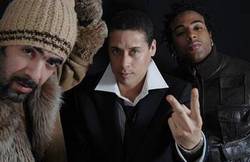Cuban Group Orishas and Feelings
- Submitted by: admin
- Arts and Culture
- Culture and Traditions
- Havana
- Music
- national
- personalities
- Personalities
- 01 / 06 / 2010

We don't enter the studio with the idea of making a catching music to sell millions, says Roldan, leading vocal of the group Orishas which par excellence represents Cuban rap and our roots at an international level.
How does Roldan begin in music?
My father was a singer. In my house when there was a huge party until dawn, I was the only of my brothers who didn't go to bed. I was around seven or eight years and I already started to like music, I don't know why, but I stayed listening there.
Until one day I started to imitate my dad, to try to do my thing and little by little I realized that what I really liked was singing.
I took the guitar and began to play the tumbao of country songs, I learned like that, alone, until one day I memorized the lyrics of a song, I sang it to him, I don't remember what song it was, I insisted because I loved him, I imagine like someone
who likes painting. Then he asked me “who taught you that?” I said: I memorized it looking at you. From there on he helped me a little bit, I began to sing at school and until today, thirty eight years.
How do you get to Orishas?
I travelled abroad in 1995 with a group of Cuban traditional music heading for France. I studied classic guitar here, and as soon as I graduated I signed up a contract with a septet named Rico Son and we went to a Festival in Biarritz.
We had like two or three weeks of concerts and later we left to Paris; six months later I returned with the group to Cuba to travel to Palm of Majorca then in 1996; I had a girlfriend in Paris whom I had met a year earlier; I decided to leave the group and I went to Paris.
I began to sing in a disco with a group where there were many Latin emigrants and one day I had this proposition of being part of a rap project. I hated and I hate rap, the only thing I like about rap is Orishas, my formation is Cuban music, classic music, but as the proposition came from a friend of mine, Livan, who is no longer in the group, I said yes.
The next day I went to the studio, the first song I recorded was “Represent” and I feel in love for the project right away, that’s where Orishas began.
That was late in 1997, Ruzzo and Yotuel had gone to a rap festival in Paris, then Livan took advantage that we all were there, that is, three rappers and a singer, to shape up the project.
I confess that at the beginning, when they proposed it
to me I had little desires; what cheered me up was that they were Cubans like me and I wanted to help them, but as I told you, when I listened the first songs I accepted at the moment.
It’s been twelve or thirteen years since then, that’s when we recorded the first demos late in 1997 until the first disk, A lo Cubano, hits the market in 1999.
I think that innocence was something that helped greatly in the advance of this project, because at first no one knew what was going to happen; we record seven songs in a demo tape and suddenly we had three contracts stuck in the studio, Universal, Sony, and Emy.
Your main influences?
Several, I’ve heard a lot of everything, not just Cuban traditional music, Los Compadres, group where Compay Segundo played, also a lot of music of Compay himself, Las D’Aida, Los Zafiros that I like a lot, and later Ruben Blades, Oscar de Leon, Frankie Ruiz. Classic music: Mozart, Beethoven, Bach.
Is Orishas planning to continue defending its style of mixing rap, hip-hop and Cuban music or are you interested in making a few changes?
That can’t happen because we don't have another option, and we don't want to do anything else. I don't know either why Orishas was born, neither how we are here.
What I do know is that we believe that in a way we created an original style that
it’s identified within all that exists in the current Latin market, speaking of reggaeton, Cuban music, hip hop, and even of Cuban groups.
Source: www.cubasí.com
Comments